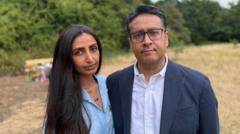Could Alzheimer's Be Worse Than Cancer? Fiona Phillips Reveals Heartbreaking Truth

Understanding Alzheimer's Disease: A Personal Journey Through Fiona Phillips' Experience
Alzheimer's disease is a condition that deeply affects both those diagnosed and their loved ones. The recent revelations from television presenter Fiona Phillips and her husband, Martin Frizell, provide profound insight into the emotional and practical challenges that accompany this debilitating illness. Their candid reflections, shared in their memoir "Remember When: My Life with Alzheimer’s," shed light on the complexities of living with this condition and highlight the need for more awareness and support.
The Diagnosis: A Life-Altering Moment
In July 2023, Fiona Phillips publicly revealed her Alzheimer's diagnosis, a moment that transformed her life and the life of her family. At 64 years old, Phillips's experience is a stark reminder that Alzheimer's does not discriminate by age. It presents unique challenges, from memory loss to emotional distress, affecting daily life significantly. The couple's journey illustrates the reality of navigating the disease in a public spotlight while managing personal struggles behind closed doors.
Martin Frizell's Perspective
Martin Frizell, Phillips's husband of 28 years, has taken on immense responsibilities since her diagnosis. In a heartfelt statement, he expressed a brutal honesty regarding his feelings: he would have preferred her to have cancer instead of Alzheimer's. This statement may seem shocking at first, but it underscores the harsh realities of Alzheimer's disease. Unlike cancer, which often comes with treatment options and potential recovery, Alzheimer's offers little hope. Frizell recognized that the lack of available treatment pathways and support for Alzheimer's patients leaves families feeling isolated and overwhelmed.
The Daily Impact of Alzheimer's
As a caregiver, Frizell's life has dramatically shifted. Responsibilities that once felt mundane—such as paying bills and managing household chores—now take on new significance. The couple has enlisted the help of a trained carer, a decision made to ease the burden on both Frizell and their son, MacKenzie, who is 23 years old. This arrangement allows Frizell to focus on his wife's emotional needs while still managing the practical aspects of their life together.
Fiona's Struggles with Alzheimer’s
Fiona Phillips's own reflections on her condition reveal the profound impact Alzheimer’s has had on her cognitive abilities and emotional well-being. In her memoir, she describes her struggles with memory loss and the frustration of losing her ability to communicate effectively. The feeling of “chasing a £5 note that’s fallen out of your purse on a gusty day” encapsulates the disorientation that often accompanies Alzheimer’s. This vivid analogy resonates with anyone who has experienced the frustration of forgetting words or losing train of thought.
Communication Challenges
One of the most challenging aspects of Alzheimer's is the effect it has on communication. Phillips admits to often losing her train of thought mid-sentence, a situation that can be both embarrassing and disheartening. This struggle serves as a reminder of the importance of patience and understanding when interacting with individuals affected by cognitive decline. Phillips's experience emphasizes the need for open dialogue about the condition, allowing friends and family to better comprehend the changes she undergoes daily.
Awareness and Perception
Fiona Phillips has expressed her concerns about public perception of Alzheimer’s disease. Many associate the condition with older individuals exhibiting severe symptoms, often overlooking the fact that it can manifest in various ways. Phillips's active lifestyle—socializing, exercising, and engaging in everyday activities—contradicts the stereotype of the “typical” Alzheimer’s patient. By sharing her story, she aims to challenge these misconceptions and foster a more nuanced understanding of the disease.
The Role of Caregivers
Caregivers, like Martin Frizell, play a crucial role in the lives of those with Alzheimer’s. Their responsibilities extend beyond medical care; they often become emotional anchors and primary supporters. The journey can be both rewarding and exhausting, requiring immense emotional resilience. In many cases, caregivers must adapt to new roles, such as managing finances and household tasks, while also providing companionship and support to their loved ones.
Support Systems for Caregivers
Recognizing the challenges faced by caregivers, it is essential to establish a strong support system. Here are some strategies that can help caregivers maintain their well-being:
- Seek Professional Guidance: Engaging with healthcare professionals can provide caregivers with valuable resources and support.
- Join Support Groups: Connecting with other caregivers can provide emotional support and practical advice.
- Prioritize Self-Care: Taking time for oneself is crucial. Caregivers should engage in activities that rejuvenate their mental and physical health.
- Utilize Respite Care: Temporary care services can provide caregivers with a much-needed break, allowing them to recharge.
Looking Ahead: The Future of Alzheimer's Care
The experiences shared by Fiona Phillips and Martin Frizell highlight the urgent need for increased awareness and research into Alzheimer's disease. As the population ages, the prevalence of Alzheimer's is expected to rise, making it imperative for society to address the challenges associated with this condition. Advocacy for better treatment options, support systems, and public understanding is crucial in changing the narrative surrounding Alzheimer’s.
The Importance of Research
Investing in research is vital to discovering new treatment modalities and potential cures for Alzheimer's disease. Fundraising efforts and awareness campaigns can contribute to advancing our understanding of the condition. Increased funding can lead to breakthroughs in early diagnosis, treatment options, and ultimately, a better quality of life for individuals affected by Alzheimer's.
Conclusion: A Call for Empathy and Understanding
The journey of Fiona Phillips and Martin Frizell serves as a poignant reminder of the human side of Alzheimer's disease. Their story is not just about the struggles of memory loss but also about love, resilience, and the importance of empathy. By sharing their experiences, they encourage us to foster a deeper understanding of Alzheimer's, to support those affected, and to advocate for advancements in care and treatment.
As we reflect on their journey, we are reminded that every individual with Alzheimer’s has a unique story. Let us commit to listening, learning, and advocating for better support and understanding for all those navigating this challenging journey.
FAQs
What are the early signs of Alzheimer's disease?
Early signs include memory loss, difficulty concentrating, confusion about time and place, and challenges in planning or solving problems. Recognizing these signs early can be crucial for seeking diagnosis and support.
How can caregivers best support individuals with Alzheimer's?
Caregivers can provide emotional support, establish routines, maintain open communication, and encourage social interactions. It's also important for caregivers to take care of their own well-being.
What resources are available for those diagnosed with Alzheimer's?
There are various resources available, including support groups, educational programs, and professional care services. Local health organizations and Alzheimer's associations can provide valuable information and assistance.
As we learn more about Alzheimer's disease, how can we collectively work towards a better understanding and support for those affected? #AlzheimersAwareness #CaregiverSupport #FionaPhillips
Published: 2025-07-06 08:46:31 | Category: Entertainment



